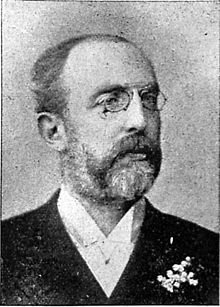Karl Grammann
Christian Heinrich Karl Grammann (also: Carl , born June 3, 1842 in Lübeck , † January 30, 1897 in Dresden ) was an important composer of the late Romantic movement in Vienna and Dresden.
Life
origin
Grammann came in 1842 as the son of the businessman Alexander Grammann (* 1813 in Turku , † 1873 in Lübeck) and his wife Emma, née. Marty in Lübeck. The Grammanns were related by marriage to the Mann family through the Marty family. His birthplace, Beckergrube 52, was acquired in 1881 by Thomas Johann Heinrich Mann , the father of Thomas Mann and Heinrich Mann .
career
During his youth, Grammann initially had the will to follow his inclination, to push back on his father's instructions and to study agriculture at the universities in Bonn and Halle .
It was thanks to the advocacy of Emanuel Geibel , who was friends with the Grammann family and largely related, that Gramman was allowed to devote himself to music. One of his earliest attempts at composition, the nightingale entzett, on which Geibel's verse was based, was sung for the first time in the poet's apartment and was so well received that Geibel put in a good and, above all, effective word with his father for his son. When Julius Rietz (Dresden) and Carl Reinecke ( Leipzig ) spoke out favorably on his talent, he was finally allowed to attend the Conservatory in Leipzig at the age of 25 . There he reworked the trio and published it as Opus 4 in the Lübeck publishing house Kaibel . Also while he was still studying, which was to last until 1871, Geibel's war song “Up my people” was set to music in 1870, with patriotic enthusiasm for a male choir or a singing voice with piano.
After completing his studies, Grammann went to Vienna as a freelance composer . Only one of his later songs, “My heart is like the dark night” op. 36,1, was to have a text from Geibel. Inwardly, however, he remained connected to the poet. The deep impression that Geibel's death left on him in 1884 was musically condensed into the piano fantasy in F minor, Op. 50, dedicated to “Dem Manen Emanuel Geibel”. His motto was the poet's verses “If someone died whom you loved below "Prefixed.
From 1885 the composer worked in Dresden. After his death in 1897 he was buried in the Burgtorfriedhof in Lübeck.
Grammann composed instrumental works as well as operas. He owned a library of French fiction, which his sister gave to the royal public library after his death .
Works (selection)
- 1875: Melusine - romantic opera in three acts, op. 24, first performance on September 25, 1875 in the Wiesbaden Court Theater
- 1881: Thusnelda and the triumphal procession of Germanicus - romantic opera, op. 29, premiered in Dresden
- 1882: The Andreasfest - romantic opera in three acts, op. 35, premiered in Dresden
- 1894: Ingrid - Opera in two acts, op.57
- 1894: Das Irrlicht - Opera in one act, op.58
literature
- Hermann Arthur Lier: Grammann, Karl . In: Allgemeine Deutsche Biographie (ADB). Volume 49, Duncker & Humblot, Leipzig 1904, p. 508.
- Ferdinand Pfohl : Carl Grammann, an artist's life. Schuster & Löffler, Berlin and Leipzig 1910
Web links
- Works by and about Karl Grammann in the catalog of the German National Library
Individual evidence
- ↑ Lübeck Geibel composers. In: Father-city sheets . Born 1919, No. 1, issue of October 12, 1919.
- ↑ Todtenschau. In: Dresden history sheets. No. 4, 1897, p. 72.
| personal data | |
|---|---|
| SURNAME | Grammann, Karl |
| ALTERNATIVE NAMES | Grammann, Christian Heinrich Karl (full name); Grammann, Carl |
| BRIEF DESCRIPTION | German composer |
| DATE OF BIRTH | June 3, 1842 |
| PLACE OF BIRTH | Lübeck |
| DATE OF DEATH | January 30, 1897 |
| Place of death | Dresden |
